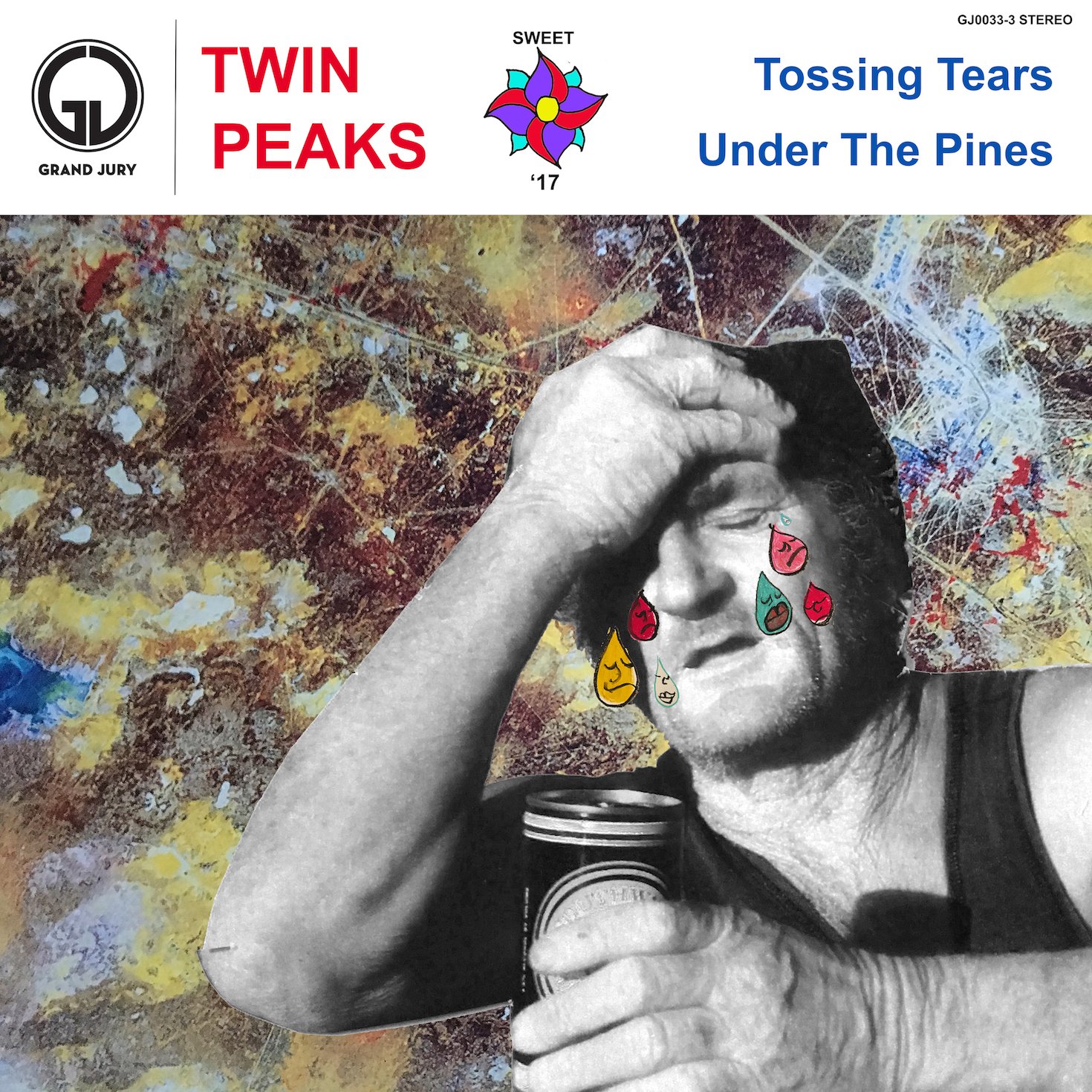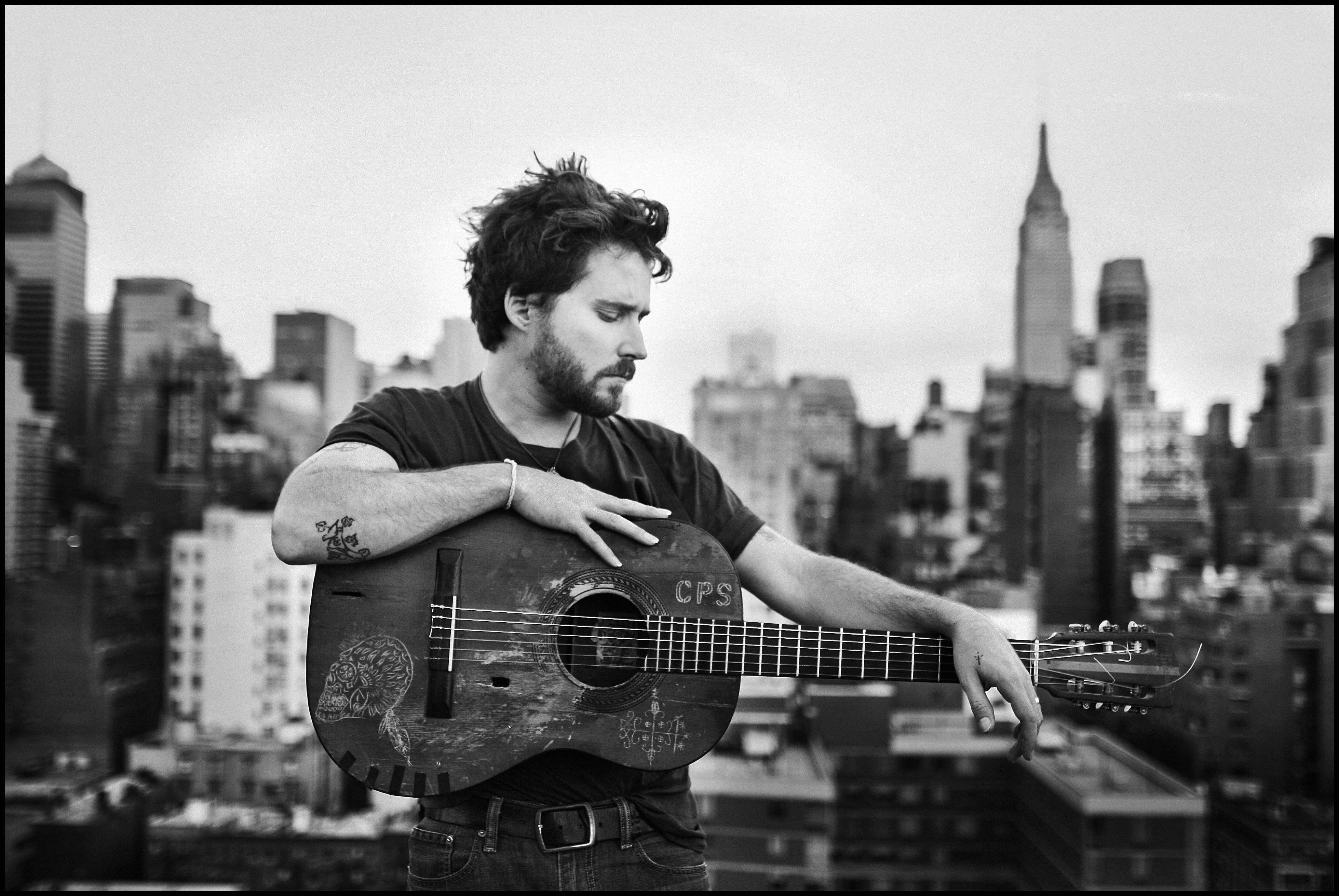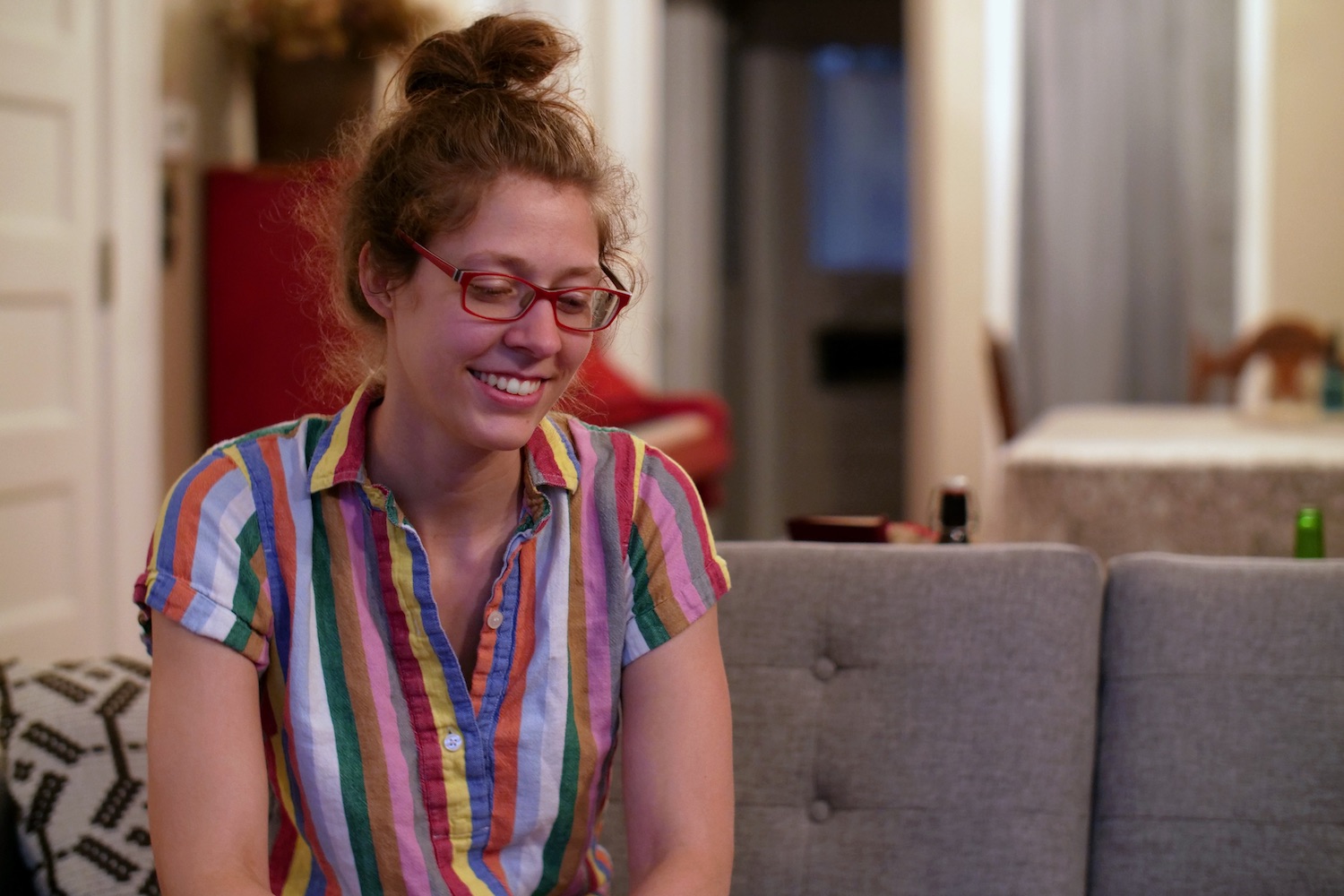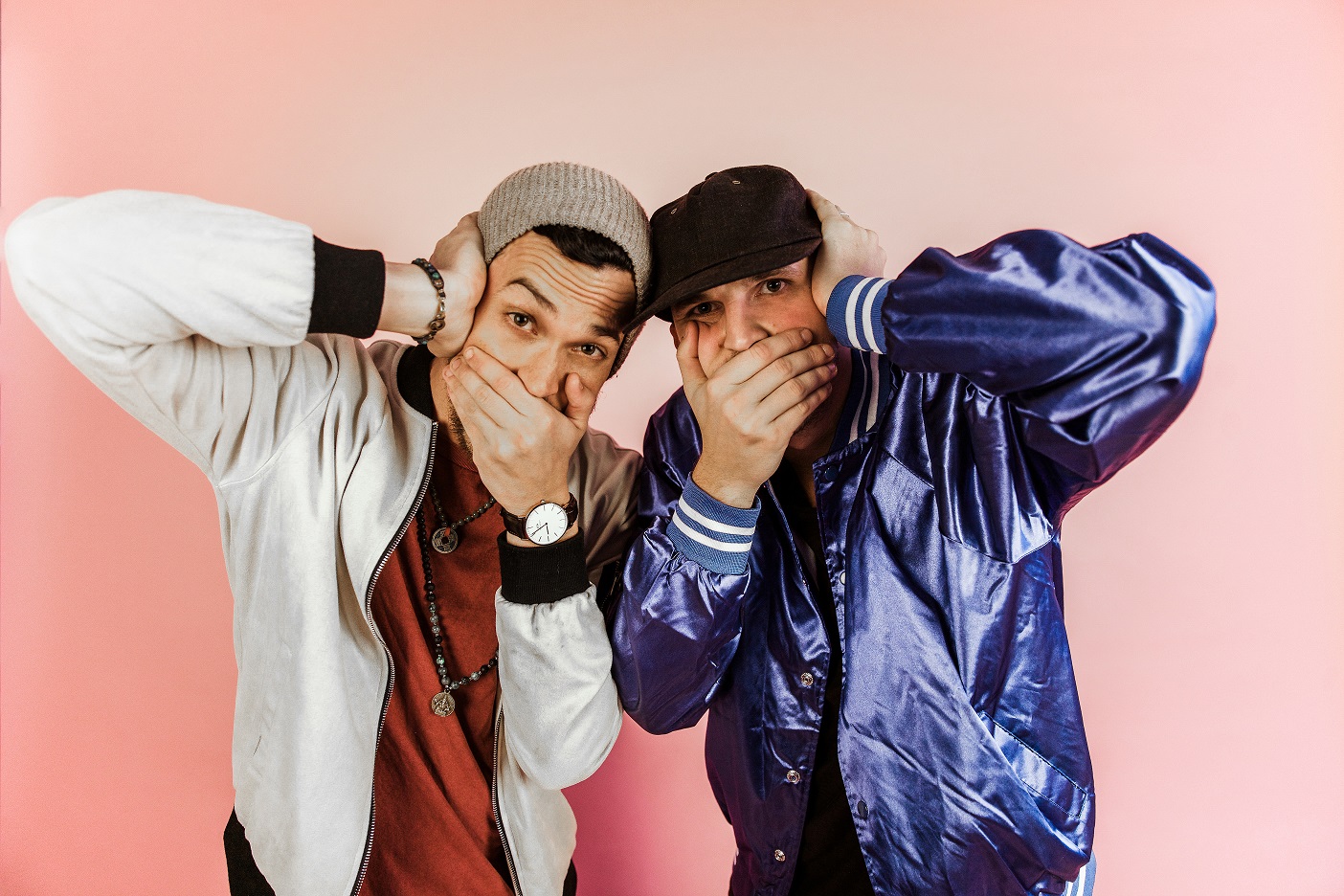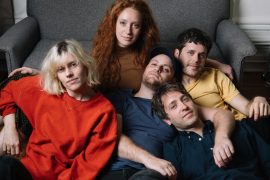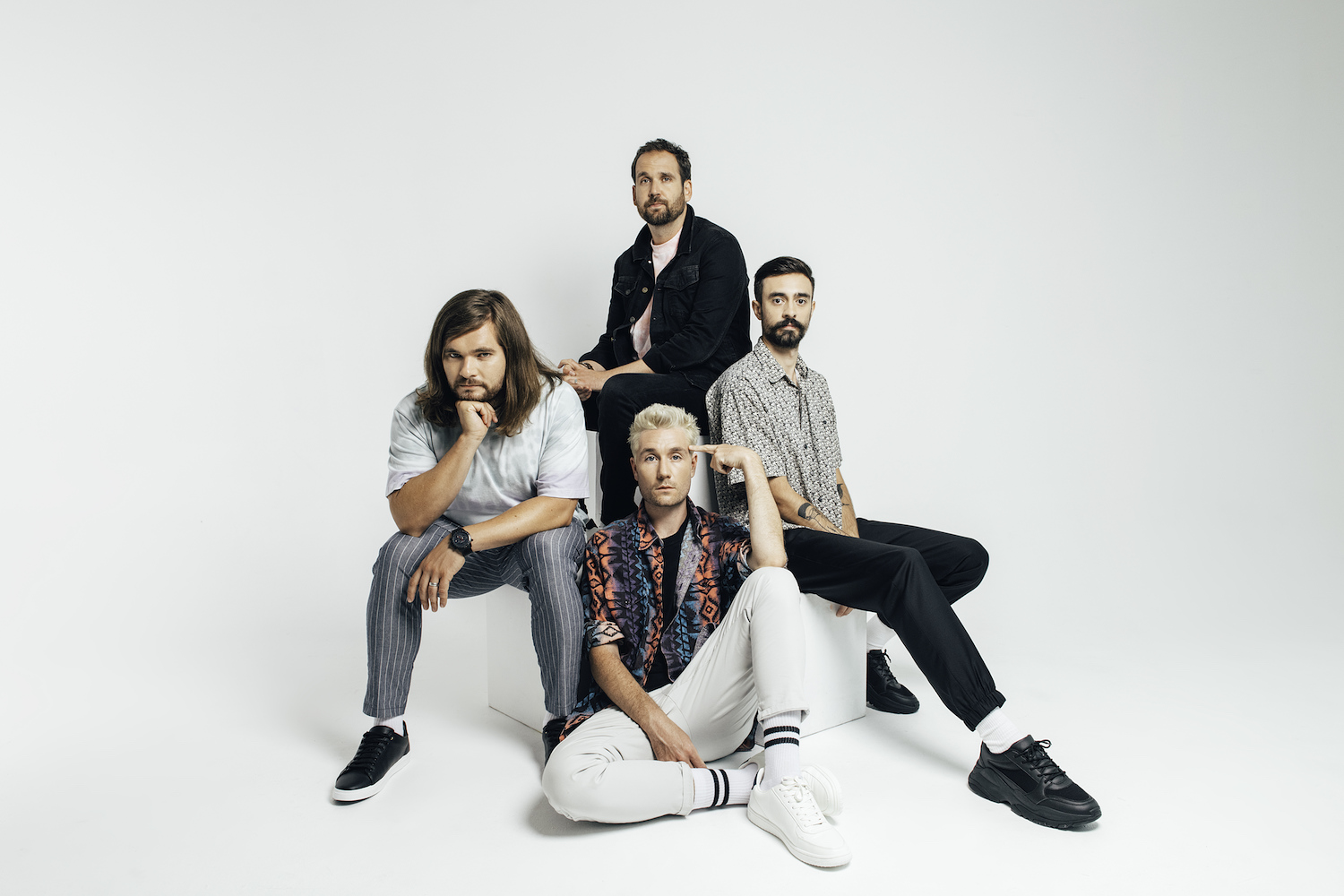From the hubbub of New York City to the intimacy of a relationship, corner club recreate worlds through their marveling dispositions.
Stream: ‘little love lullabies’ – corner club
“Let’s say you’re at a party. Where in the room are you? The answer for me and Mike is that we’re in opposite corners of the room. We’re corner people,” Savannah Du tells me, after I ask her about the origin behind the duo’s band name. She loves answering this question. In college, Mike Zhang and Savannah Du met in this same way, locking eyes from two corners across the room.

The thing is, corners are what hold the borders of a space together, even if they are occasionally overlooked. And corner club is all about blowing up dimensions, the everyday sounds otherwise glossed over: a half-heard dialogue from city streets, the wind gushing in the moment you open a door, knickknacks tumbling to the ground. Casual bits of sound make their way into corner club’s field-like, ambience-heavy repository. Since Zhang and Du record and produce everything themselves, these musique concrète techniques come naturally. In “Manhattanhenge,” Du clears her throat before singing. Their most popular track by far, “Manhattanhenge” was released in 2019 and has since racked up over half a million streams.
“Meet me at Manhattanhenge, meet me under Columbus Circle, I’ll be waiting there for you,” the chorus goes. Neither Zhang nor Du is from New York City originally, and maybe that’s why they are able to write city sights and locales into their songs so lovingly, with a still-new, bright-eyed wonder. “In ‘Manhattanhenge,’ the first line is that you’re sitting in a café. You’re kind of looking around, moving around Manhattan and just feeling and wondering what lives people around us are living,” Du says. New York is perhaps the most befitting of cities for the duo’s marveling dispositions. Totally stripped down, “Manhattanhenge” is soft-spoken, rooted in acoustic strumming and percussive touches. It’s exactly what you would expect from a duo whose musical project began with a Bruno Major cover.

In February, corner club released their debut EP little love lullabies, a whimsical, alliterative title that describes the content of the record exactly.
Du’s velvety, lush vocals balance the romanticism of “hiding in the covers” (“honey moon”) with the quiet devastation of “when you said love wasn’t enough” (“what if you were the one”), as the ballads navigate the course of a relationship to beginning to end. Instead of being the focal point, the city becomes a backdrop, where strolling down Ninth Avenue is only spectacular because of the lover in companionship (“binary tree”). The words turn inward, and the world shrinks to a population of two. The music cycles through the circle of fifth and back again, mirroring the seasons of love. “When we first set out to create the whole EP, we mapped it out, almost storyboarded it. We talked about the scenes and the phases of a relationship,” Zhang explains.
A lot of corner club’s release strategy is “a function of the moment that we’re in,” Zhang tells me. Moving with the spontaneity and vicissitudes of life, corner club’s music is of an autobiographical quality. little love lullabies, like so, speaks with earnestness. In conversation with Atwood, corner club talks their recording process, music as full-time passions alongside full-time jobs, and more.
— —
:: stream/purchase corner club here ::
A CONVERSATION WITH CORNER CLUB
ATWOOD MAGAZINE: IT’S GREAT MEETING YOU. WHERE ARE YOU BOTH CALLING FROM?
Mike Zhang: In general, we’re both in Manhattan, but Sav is in Boston right now. Normally we’d be together
Savannah Du: Yeah, we live next to each other in New York City.
HOW DID YOU MEET?
Zhang: We first met as friends in college. We were in the same East Asian a capella group in Princeton. We started up by doing some covers, kind of representing that acapella group. And then I just kept doing music. We had good chemistry, and once I was a year older, when I graduated, I moved to New York. Then Sav graduated, she also moved to New York, and was like, “You want to try doing music?” And then we put together a cover. Our first thing was covering “Easily” by Bruno Major. Big Bruno Major fans at the time. I guess one thing just led to another. I have’t really looked back since.
CORNER CLUB IS VERY MUCH A SELF-PRODUCED, INTIMATE OPERATION. WHAT IS YOUR RECORDING PROCESS LIKE?
Zhang: We’ve always recorded everything in my apartment. We just moved, so the setup is still kind of getting worked out, but everything literally happens behind me. It’s always been like that. We take a lot of pride in recording everything on our own and being self-produced in that way. I don’t know if the process has changed that much over time. I think we’ve learned how to record better and how to approach it from a methodology standpoint, where we need to do vocal takes a certain way.
But our sound has certainly changed over time, in terms of what we want to explore and — aside from just vocals and instruments — recording other kinds of sounds. From say, the kitchen, or just all over the place. We’ve been making more of our own sounds and putting those into our productions, so maybe that has been an evolution. But I really like that we’re just kind of in our apartments. It’s very cozy and homey.
WHAT IS THE SONGWRITING PROCESS ITSELF LIKE? SONICALLY, HOW DOES A TRACK PROGRESS AND WHAT ARE YOU INFLUENCED BY?
Du: We usually write songs in two ways. One way is that I’ll get the lyric started. A lot of the time, they’ll be pulled from my personal life, my relationships, or just sitting in a cafe, wondering what kind of lives the people around me are living. In “Manhattanhenge,” the first line is that you’re sitting in a café. You’re kind of looking around, moving around Manhattan and just feeling and wondering what lives people around us are living.
And then little love lullabies, which is our debut EP, was telling the story of a relationship that I had from beginning to end. It was very much an introspective project, but at the same time I tried to make it a universal story. I did some slam poetry in college, so some of my lyric-writing pulls from that style. And there are a few things that we really like to do: a lot of alliteration, a lot of slant rhyme. It’s become kind of a meme. When we were thinking of how to do little love lullabies, that was something that I really liked about the title. For musical influences, I think Mike probably has a better story about this than I do.
Zhang: It’s funny because I feel like the stuff that we listen to, or at least the stuff that I listen to, doesn’t necessarily get expressed very clearly in the music that we make. I listen to a lot of The 1975. I’m a die-hard fan. Lately I have also been listening to a lot of K-pop. I really like SHINee, who’s recently come back with a new album. I’ve been really enjoying that. Our songs don’t necessarily sound like K-pop or The 1975, but I think little influences come out — or just how I think about things and certain attention to detail. I think down the line, those influences might be expressed more and more. But we’re moving project by project, in a sense.

YOU HAD RELEASED A FEW SINGLES IN A VERY UNHURRIED, DELIBERATE FASHION. WHEN AND HOW DID YOU DECIDE TO RELEASE A FULL-FLEDGED DEBUT EP?
Zhang: We started working on the EP in earnest right after the previous single, “tell me,” was released. That was around August. September through December of last year was kind of the bulk of the recording and production process. Sav started writing some of the songs for it way earlier.
Du: The conception of the EP was actually the last song, “what if you were the one.” That one I had written when I went back home to Maryland, during the summer, and it was reflecting on a relationship that had ended, especially with the weirdness of being remote and COVID and everything. I showed it to Mike, and he was like, “What if we turned this into a bigger project?” We actually had a different EP planned at the start of the year, and we were going to piece together a bunch of fragments that we had worked on in the previous year. But we decided that this was the right time to release this one. So we ran with it. One of the songs on there, “too good,” was actually written in 2019. It was originally a very heavy, slow piano ballad. To fit it into the EP, we changed it up a bit.
Zhang: In general, there’s not a lot of planning that goes into our release strategy. A lot of it is a function of the moment that we’re in. “manhattanhenge” and “sitting across” are both light, acoustic songs, and that was just how we first started. Sav and I started doing music with me playing guitar and her singing, and the first songs reflect that. As we’ve progressed, “tell me” was a piano ballad. The EP is really the culmination of a lot of continued iteration over what we want to sound like and things that we want to explore. So it kind of just happened. It’s very symptomatic of how we operate.
I UNDERSTAND THAT THE EP HAS SOME VERY INTENTIONAL HARMONIC PROGRESSIONS AND CYCLES. COULD YOU SPEAK A LITTLE MORE ON THAT?
Du: Yeah, so cycling through the different keys, part of it came out of the fact that when we think about little love lullabies, it’s an arc, but it’s also a cycle. You begin the relationship, you go through the motions, and then it goes through the cycle. So the idea of cycling through partially the circle of fifths and then going backwards was part of that idea.
Zhang: The other thing is a lot of the lyrics are self-referential, where one thing references another song or one lyric will lead into the next in a very intentional way. The production really mirrors that. When we first set out to create the whole EP, we mapped it out, almost storyboarded it. We talked about the scenes and the phases of a relationship. We also placed them in a time and space. What that did was it led us to record a bunch of different ambiences. If you listen very carefully, every song has some kind of background sound throughout. Sometimes it’s just a fuzzy thing. Sometimes it’s almost more for us than the listeners.
For example, in the beginning of “honey moon,” when you hear the opening of the door — that’s literally me opening the door on my porch or balcony, and recording the outside sound. And the whole idea there is it’s a very dreamy song. You’re looking at the moon, right? You’re literally entering this kind of space where you’re allowed to look outside. And so there’s a whole universe, a sonic universe that we want to have. All the ambiences lead into each other, mirroring not only the lyrics and the content of the song, but also these phases. Every transition was very tightly mapped out. We were very picky about them.
WHAT ARE YOUR FAVORITE TRACKS ON THE RECORD?
Du: For me, it’s definitely the last one, “what if you were the one.” It has a pretty special place in my heart. From a lyrical standpoint, it’s also my favorite one. The structure is just something that I really enjoyed.
Zhang: I say the same a lot. Because I feel like that song is hard to listen to. Even for me, it’s hard to listen through without tearing up a little bit, if I’m in the mood. But I think “dreamt home” is a song that I am particularly proud of, because I just love the melody. In the song, there’s a lot of production elements that kind of get introduced and swell together. In the second half, we have the harp, the harmony, and the baseline. They all kind of like build up into this really lovely moment, and the chimes fall away. It’s very fulfilling to reach the final result on that.
LITTLE LOVE LULLABIES ALSO EXPAND UPON YOUR ACOUSTIC SOUND INTO MORE SYMPHONIC SPACES. ARE YOU LOOKING TO EXPLORE FURTHER ON THE PRODUCTION FRONT?
Zhang: It’s funny, we used to feel like the music that we’re making, once they release, we had already moved on from that sound in our own lives, because releasing takes an extra month or two. We’re kind of continuously chasing an evolution of our own sound that we haven’t reached yet. I think that in the future, there’s a lot of electronic stuff that we want to explore. The next song that we’re planning to work on, we refer to it as a Tik Tok bop. It just means that there’s a lot of cool electronic, random sound effects that we’re looking to explore next. And I would expect that our sound will grow more electronic over time, in some respects, both from a percussion standpoint and in terms of using fun synth sounds and that kind of stuff. At the same time, I still think it’s moment by moment. So it could change after we do something like this. I’m not really sure how to think about it long-term, but I think there’s definitely a picture. Every song we do, we have an inspiration playlist that we make for that song. And it’s really different, song by song, throughout our history. I guess we’ll see. But for now, that’s kind of what we’re thinking.
Du: We often will think about things conceptually, and there are some — maybe not necessarily sonic avenues that we’re going down, but we were joking about doing a song in a weird time signature, or something really funky. So that was one idea for maybe two or three songs later.
HOW HAS QUARANTINE BEEN FOR YOU? DO YOU MISS LIVE PERFORMANCES?
Zhang: Yeah, it’s been a long time now. One of the caveats is that we didn’t play too much live beforehand. If the pandemic hadn’t happened, 2020 would have been the year that we started doing more of that. I think we’re still getting some of our bearings playing live, figuring out what kind of setup we want to have. But we’ve been able to do some really cool live stuff so far. We got to do a rooftop performance for the speaker series called Crushing the Myth. That was super fun, just being on a rooftop on SoHo. We almost got rained out, but, you know, it’s just stuff that makes you remember those kinds of events more. We played a couple of different open mic setups at the Museum of Chinese in America also, and that has been a really fun series we participated in. We did do a Zoom show a month ago, which was really interesting, because we got to explore playing along with some of our backing tracks. If we do get to play live again, one day, that aspect is something we want to explore —how can we recreate the songs while also having a significant live portion?
Du: We had planned out a series of apartment shows. Pre-pandemic, Mike was really into making sourdough. We invited a bunch of people over and had a little musical mixer, had some bread, and then just played a few of our songs that hadn’t been released. Part of it was just getting the practice of doing live shows, because it was more low stakes. It was also just a lot of fun to practice together. But we did one before COVID happened, so we’ll see when we can do those again.
YOU MENTIONED PARTICIPATING IN CRUSHING THE MYTH AND PLAYING AT THE MUSEUM OF CHINESE IN AMERICA. WHAT HAVE YOUR EXPERIENCES IN THE INDUSTRY BEEN LIKE AS ASIAN AMERICANS? IS THAT SOMETHING THAT YOU ACTIVELY THINK ABOUT IN RELATION TO YOUR MUSIC?
Du: I do think we think a lot about being Asian-Americans in a creative field, partly because of the ACM Facebook group. We’ve always said that it’s interesting because music is something where you can’t necessarily tell someone’s race or background just based on their voice alone. So as opposed to representation in movies or visual media, it’s a very different experience. It’s something that we’ve started noticing. We don’t necessarily write about Asian-American content, but a lot of the times when we’re listening to Spotify, or listening to Discover Weekly or something, it’s actually very easy for me to tell whether a singer is Asian-American based on their enunciation or based on some patterns in the production. So part of what we think about is — I wonder, is Spotify putting me into a group of only Asian-American artists with fewer than 100,000 monthly listeners? And is this going to turn into something that algorithmically can only appeal to a certain type of audience? Thathas been really tough in a way, in that it’s so hard to quantify.
Zhang: There’s a general difficulty about any minority, where there’s just a lot of ambiguity, right? You don’t know whether your successes or your failures come from something race-related. I’ve heard advice, or I’ve talked to people who will say statements to me, like, if you email a magazine, and they see your face, they’ll just delete your email. Or they’ve reached their, quote-and-quote quota of representation, and that kind of stuff. These are things that, obviously, I don’t know if that happens, but enough people feel that way to share sentiments like that to me. And so that’s just an ambiguity, right? And then on the other side of it, from a success standpoint, we’ve definitely become a bit more established over time as artists. And then it’s, are we getting opportunities because there is an interest in Asian-Americans now? And what happens if there isn’t later? Is it because they like our music? That plays into both editorial and algorithmic perceptions and judgments. And so I think that’s one of the more difficult things. It’s not knowing what to celebrate, or why. Why things happen. I think everything that’s happened so far, we’re very grateful for it. But to be frank, that’s kind of tough to parse sometimes.
DID YOU EXPECT THE LEVEL OF SUCCESS YOU’VE REACHED WITH “MANHATTANHENGE?”
Zhang: If you scroll down far enough in our Instagram feed, you’ll see this video where we hit a thousand plays on “manhattanhenge” for the first time, and it’s literally both of us screaming. So to answer your question, no, not really. To be honest, whatever streaming success we’ve had so far, it’s been completely unexpected. I work as a data scientist as my day job, and I’m really into the data aspect of it. Paying a lot of attention to data, I can come up with some hypotheses for why, but I truly don’t understand how.
LOOKING INTO THE FUTURE, WHAT ARE YOUR MUSICAL GOALS?
Zhang: We’re both people that generally bring a lot of ambitions to things we do. We want to make music, and we want our music to connect with people. We’re not really great goal-setters, to be honest. We don’t think about the streaming side of things too much. But I certainly feel really lucky that a lot of people have liked the music that we’ve put out so far.
Du: I’m generally more pessimistic than Mike is as a person, and I also don’t look at the data. So when we released little love lullabies, I kept saying that if I can make one person cry, that will be enough for me. I think at this point, because there’s such a big difference between “manhattanhenge” and everything else, the numbers have somewhat lost their meaning. But it’s mostly just a feeling of gratefulness. And yeah, sometimes disbelief.

DO YOU HAVE HOPES OF TURNING MUSIC INTO A FULL-TIME CAREER?
Zhang: We’ve had a mantra really early on, where our goal is just to keep going. Because we’ve always done music alongside work, it’s something we’ve never taken for granted. It takes a lot of time. A lot of things have to come together for us to be able to do it, so being able to make music every day feels like a blessing. And anything that comes along, we’d be open to. We’re not necessarily actively looking to get signed or like anything like that. I think there are a lot of projects that we would like to do tangential to music. There are a lot of aspects of being independent that are really valuable to us. But in general, our goals are just to keep going and make music.
Du: One way we describe it to people is that we work full-time jobs, and music is a full-time passion. I currently work in tech. I used to work as a management consultant. And since we’re lucky enough to be able to end work usually by six, we have the entire six to ten together. And if we plan our weekends, we can record long sessions then. I wouldn’t say it’s easy — it took a process to get to a point where we scheduled everything out, where we’re happy with the balance between work, music, socialization, and everything else. But as long as we can keep this going, I’m happy doing things this way.
Zhang: Oh, and hopefully going on tour one day.
LASTLY, WHERE DID THE NAME “CORNER CLUB” COME FROM?
Du: I love answering this question. One question that I usually like to ask people is — let’s say you’re at a party. Where in the room are you? The answer for me and Mike is that we’re in opposite corners of the room. We’re corner people. In college, we were both in an acapella group, and there was definitely a moment where we were in opposite corners of the room, made very brief eye contact, and we were both just like, yeah. So that’s where the name comes from.
— —
:: stream/purchase corner club here ::
— — — —

Connect to corner club on
TikTok, Facebook, Twitter, Instagram
Discover new music on Atwood Magazine
? © 2021
:: Stream corner club ::

